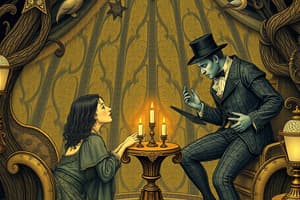Podcast
Questions and Answers
What does Jekyll mean when he concludes 'that man is not truly one, but truly two'?
What does Jekyll mean when he concludes 'that man is not truly one, but truly two'?
Jekyll means that there are 2 sides of his personality.
What good does Jekyll believe may come out of his experiment?
What good does Jekyll believe may come out of his experiment?
Jekyll believes his experiment can benefit society by separating people from their good and bad sides of their personality.
How does Jekyll say he feels the first time he drinks the potion?
How does Jekyll say he feels the first time he drinks the potion?
Jekyll says he feels sick and his bones were grinding the first time he drank the potion.
What purpose does the mirror serve in his experiment?
What purpose does the mirror serve in his experiment?
According to Jekyll, why is Hyde so much smaller?
According to Jekyll, why is Hyde so much smaller?
Why does Jekyll say he became Hyde instead of an angel?
Why does Jekyll say he became Hyde instead of an angel?
In what way does Jekyll become enslaved?
In what way does Jekyll become enslaved?
How does Jekyll react to Hyde's wrongdoings?
How does Jekyll react to Hyde's wrongdoings?
Why is a separate bank account opened in Hyde's name?
Why is a separate bank account opened in Hyde's name?
What happens one night two months before the murder of Sir Danvers?
What happens one night two months before the murder of Sir Danvers?
Why is this incident so important?
Why is this incident so important?
What are the pros and cons that Jekyll weighs in making his decision to remain Jekyll?
What are the pros and cons that Jekyll weighs in making his decision to remain Jekyll?
Why does Jekyll reverse his initial choice and once again become Hyde?
Why does Jekyll reverse his initial choice and once again become Hyde?
What steps does Jekyll take to prevent himself from becoming Hyde again?
What steps does Jekyll take to prevent himself from becoming Hyde again?
What happens one January day in Regent's Park?
What happens one January day in Regent's Park?
When he came to himself at Lanyon's house, what fear replaces Jekyll's 'fear of the gallows'?
When he came to himself at Lanyon's house, what fear replaces Jekyll's 'fear of the gallows'?
What problem does Jekyll encounter with the drug?
What problem does Jekyll encounter with the drug?
From this point forward, what happens to Jekyll while he sleeps?
From this point forward, what happens to Jekyll while he sleeps?
How does Hyde torment Jekyll, and why?
How does Hyde torment Jekyll, and why?
What keeps Hyde from committing suicide?
What keeps Hyde from committing suicide?
Why is it symbolic that Jekyll's first supply of salt was impure?
Why is it symbolic that Jekyll's first supply of salt was impure?
Why does he write that as he finishes his confession, 'I bring the life of that unhappy Henry Jekyll to an end'?
Why does he write that as he finishes his confession, 'I bring the life of that unhappy Henry Jekyll to an end'?
Study Notes
Jekyll and Hyde Key Concepts
- Jekyll believes that every person has duality; he acknowledges the struggle between good and evil within oneself.
- Jekyll's experiment aims to separate good and evil natures to benefit society by allowing individuals to live with their good and bad sides apart.
- The first experience with the potion leaves Jekyll feeling physically ill, indicating the dangerous and unnatural nature of the transformation.
- A mirror is used in the experiment to visually observe the drastic change from Jekyll to Hyde, emphasizing the contrast between the two identities.
- Hyde, representing Jekyll's evil side, is physically smaller and younger, symbolizing innocence corrupted by evil.
- Jekyll consciously chooses to become Hyde as a way to indulge in his darker impulses without moral consequences.
- The addictive nature of the potion leaves Jekyll feeling enslaved, compelled to drink it to experience the thrill of being Hyde.
- Jekyll feels shock and horror over Hyde's actions, demonstrating a moral connection to his evil counterpart.
- A separate bank account for Hyde allows Jekyll to protect his assets while living a double life, highlighting themes of secrecy and dual identity.
- An incident two months prior to Sir Danvers' murder marks a pivotal moment when Jekyll awakens as Hyde, foreshadowing his loss of control.
- This incident becomes crucial as it signals Jekyll's awareness of the experiment's potential dangers.
- Pros of remaining Jekyll include maintaining friendships, while cons encompass losing access to his darker desires.
- Jekyll's decision to revert to Hyde stems from untouched reminders of his darker persona, showcasing the lingering grip of his evil side.
- To prevent further transformations, Jekyll attempts to destroy evidence of Hyde’s existence, including important papers and a key.
- A significant transformation occurs in Regent's Park, where Jekyll unexpectedly becomes Hyde again, underscoring the uncontrollable nature of his experiment.
- Following his experience at Lanyon's house, Jekyll fears the horror of being Hyde compared to the fear of being executed.
- Jekyll's dependency on the potion grows as he becomes more entangled with Hyde, illustrating the addiction created by his experiments.
- Jekyll continuously transforms into Hyde in his sleep, reflecting the overpowering nature of his darker self.
- Hyde actively torments Jekyll by intruding during his sleep, revealing Hyde's desire for dominance over Jekyll's life.
- The initial supply of impure salt is symbolic of Jekyll's failed efforts to control or eliminate Hyde.
- Jekyll's confession signifies a turning point, potentially leading to suicide or a permanent embrace of his darker identity as Hyde.
Studying That Suits You
Use AI to generate personalized quizzes and flashcards to suit your learning preferences.
Description
This quiz focuses on key concepts from Chapter 10 of 'Dr. Jekyll and Mr. Hyde'. It includes important definitions and insights into Jekyll's theories about human duality and the potential benefits of his experiments. Test your understanding of the chapter's themes and ideas.




